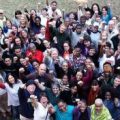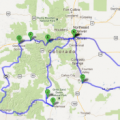
Update: Check out our new project, Health is Local, which grew out of this event!
Before I joined CCMU almost 3 years ago, I spent much of my professional career working on environmental health and justice issues. From pesticide exposure among migrant farm workers to communities facing an undue share of environmental toxins from local ports, I delved deep into the world of environmental regulations, toxicology, and occupational injustices.
It is through this work that I was originally introduced to the vision and grace of Majora Carter. My wife Haley and I remember clearly the night we first watched her now celebrated TED talk. Since that night, the impact of Majora’s work and words on my approach toward community work has been considerable. When CCMU set the focus of our 2013 luncheon, entitled “Health is Local,” I eagerly advocated for inviting Majora to keynote the event. I spent much of the past six months anticipating the event and I’ll admit I was a bit star struck upon meeting her.
At the event, Majora shared her inspiring story of community-led change in the South Bronx. She described her vision of creating communities with diverse economies and creative public spaces which is born from years of experience leveraging community assets for change. And, most aptly, she imparted the following key lessons around maintaining a community approach even in the face of major change and system upheaval:
- Embrace discomfort. Majora urged Colorado’s health care leaders to “be comfortable being uncomfortable” as major health reforms are implemented and the health care system changes rapidly before our eyes. She ensured us that major change in any sector leaves nearly every player uncomfortable. Embracing this discomfort will allow us to remain responsive and accountable as major changes role out.
- Assets first. Majora insisted that there are assets in every community, you simply have to look for them to uncover them. This sentiment is a cornerstone of community-based change, but Majora’s words carry with them years of first-hand experience. She was quick to draw out examples of assets existing in the most unlikely places in communities she’s worked in. Uncovering and building upon these assets in Colorado’s communities will be an essential part of ensuring the success of health reform in our state.
- Test and then scale. Majora also presented a six-step framework for change, which included identifying collective needs, designing innovative solutions, and trying out numerous “beta” projects before settling on which to scale up. Evaluating for impact and local feasibility is essential when deciding which test project is scalable. In Colorado, health care beta projects abound, so this step is essential if we are to make the right choice in which projects to scale in the coming years.
Here at CCMU, we believe that community-driven solutions are the cornerstone of successful health care system change. Health truly is a local, community-level issue that requires a local, community-level response. With health reform implementation rapidly approaching, our Health is Local Luncheon was a perfect opportunity to take stock in where we stand as a state and gather some much-needed energy and inspiration for the months ahead. With Majora’s key lessons in mind, I’m confident we’ll be ready.




